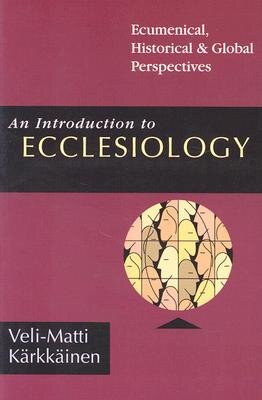Veli-Matti Karkkainen, Introduction to Ecclesiology: Ecumenical, Historical, and Global Perspectives. InterVarsity Press, 2002.
Referenced in: Ecclesiologies
LifeandLeadership.com Summary
Theology of Mission and Ministry.
Summary: Karkkainen’s Introduction to Ecclesiology is an excellent example of comparative ecclesiology, an in-depth survey of how the major Christian traditions, leading contemporary theologians, and social and ethnic groups conceive of the church.
In Part One, Karkkainen overviews seven prominent ecclesiological traditions: Eastern Orthodox, Roman Catholic, Lutheran, Reformed, Free Church (Anabaptist, Quaker, Baptist, and although not directly referenced, Christian Church/Church of Christ), Pentecostal/Charismatic, and Ecumenical. The value of this section for the purpose of church renewal is to help leaders understand that each tradition embodies some aspects of the church’s nature and purpose that other traditions capture less effectively. We understand our own tradition better when we see it in dialogue with others.
Part Two summarizes leading contemporary ecclesiologists such as Hans Kung, Wolfhart Pannenberg, and Lesslie Newbigin. One will be surprised at the readability of this section. Most practicing ministers may have little exposure to these authors, and will be less for it, especially with regard to Newbigin. Karkkanein introduces them quite well, and provides notations for those who want to read more.
Part Three describes some of the more prominent contextual theologies in places such as Asia and Latin America, as well as feminist and African-American independent churches. Of special value is the chapter on the “Post-Christian Church as ‘Another City’” which presents a compelling way of conceiving of the mission in a setting (such as North America) where the church has lost its privileged status in society.
Go to this book only if you are willing to interface with a variety of church traditions. It is an exercise in “breadth before depth,” allowing the reader to enter the world of others whose expression of church may be much different, but who are equally sincere in manifesting the kingdom. Each perspective elevates select pieces of the biblical witness, yet may deemphasize others. A good read of Karkkanein will give a minister interested in church renewal a plethora of insights into the essence of the church, which when laid alongside one’s own reflections on the biblical text, could result in a greater appreciation of God’s grand vision for his church.
From the Publisher
What is the church?
What makes the church church?
In this volume, theologian Veli-Matti Kärkkäinen provides an up-to-date survey and analysis of the major ecclesiological traditions, the most important theologians, and a number of contextual approaches that attempt to answer these essential questions.
Drawing on his international experience, global research and ecumenical awareness, Kärkkäinen presents an overview of both traditional and contemporary expressions of the Christian church. An Introduction to Ecclesiology will richly reward the student, pastor or layperson who is looking for a comprehensive and insightful overview of the unity and diversity of understandings and practices within the one church of Jesus Christ.
About the Author
Veli-Matti Karkkainen is professor of systematic theology at Fuller Theological Seminary in Pasadena, California. He has published numerous articles in international journals of theology. His books include Pneumatology (Baker), Christology (Baker), Toward a Pneumatological Theology (UPA), An Introduction to Ecclesiology (InterVarsity Press), Trinity and Religious Pluralism (Ashgate), The Doctrine of God (Baker) and One with God (Liturgical Press).
***For additional information on this resource, including reviews, click the bookstore links. Check the reference at page top or the links below for resource guides on related topics.***
Related Areas
See Other Resources on Theology of Mission and Ministry:
See Other Resources on Church Leadership and Renewal:
- Church Leadership and Renewal, Index
- Church Leadership, Theological Foundations, Ecclesiology
- Church Leadership, Philosophical Foundations – e.g. Church Growth, Missional, Emergent, and Other Missionally Responsive Trajectories
- Church Leadership, Practical Foundations – Church Dynamics and Research
- Church Leadership, Practical Foundations – Congregational Culture, Church Identity
- Church Leadership, Practical Foundations – Size Dynamics, Size Transitions
- Church Leadership, Practical Foundations – Research and Case Studies on Effective Churches
- Church Leadership, Special Situations – Small Church Development
- Church Leadership, Strategies for Renewal
See Resources on Over 100 Areas of Ministry Leadership:


